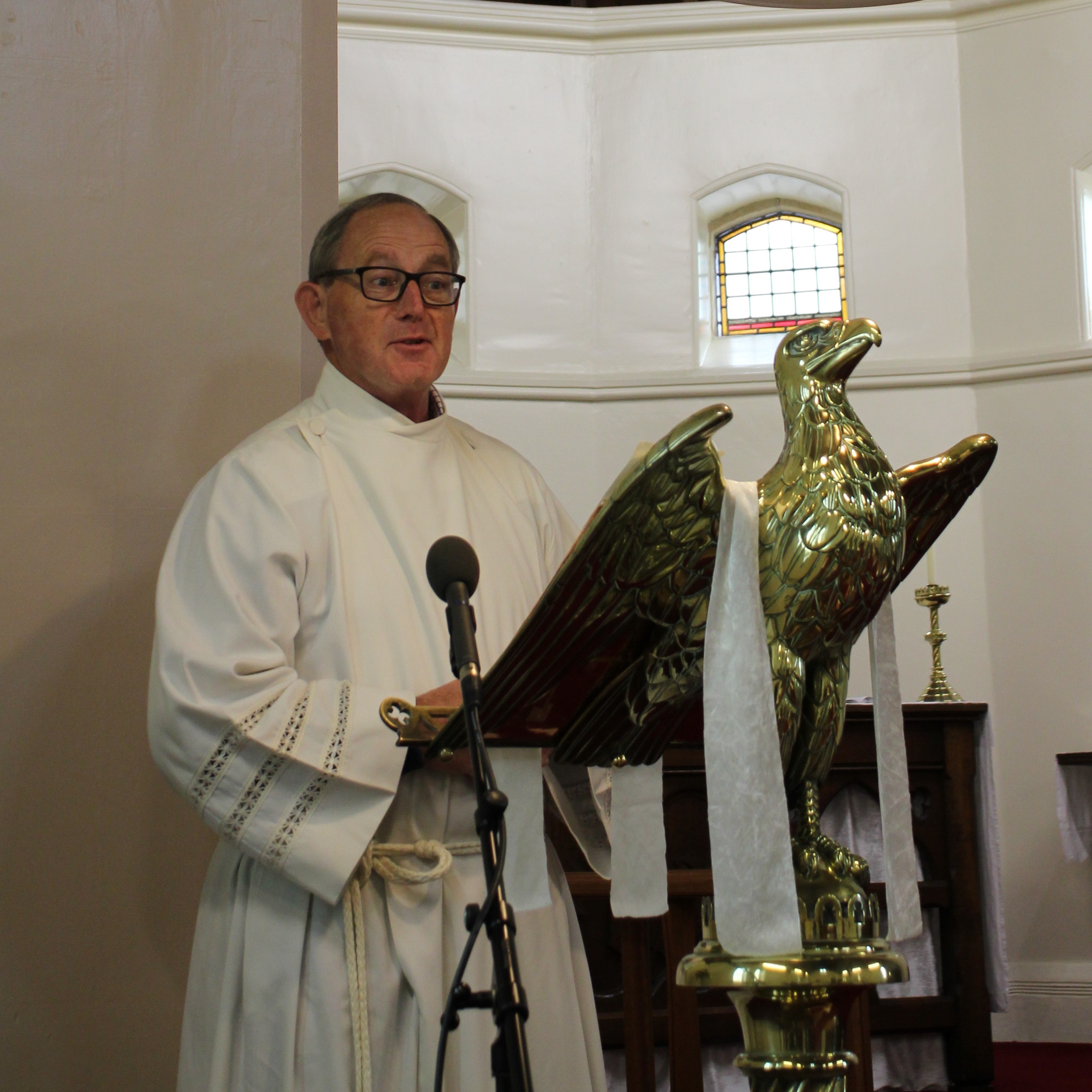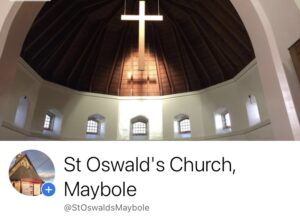Here is the sermon preached by Peter Woodifield at St Oswald’s on Sunday 19 May 2019 on the topic of vocation. Peter is training for ordained ministry in the Scottish Episcopal Church.
 Thank you for inviting me here today. Just to tell you a little about myself I am a final year ordinand and am due to be ordained at the end of September in Edinburgh. In my previous life – I can’t really say pre-retirement – I was a journalist for 40 years, with a short interlude in PR. Initially I was a political journalist working in the House of Commons for the Press & Journal in Aberdeen and then came up to Scotland in 1988 and have lived here ever since. I was business editor of The Scotsman for five and a half years before I left having seen my job advertised. For the last 13 years of my paid working life I worked for Bloomberg, the American equivalent of Reuters.
Thank you for inviting me here today. Just to tell you a little about myself I am a final year ordinand and am due to be ordained at the end of September in Edinburgh. In my previous life – I can’t really say pre-retirement – I was a journalist for 40 years, with a short interlude in PR. Initially I was a political journalist working in the House of Commons for the Press & Journal in Aberdeen and then came up to Scotland in 1988 and have lived here ever since. I was business editor of The Scotsman for five and a half years before I left having seen my job advertised. For the last 13 years of my paid working life I worked for Bloomberg, the American equivalent of Reuters.
So, what am I doing here? Well to cut a very long story short five years ago this autumn God got me in my sleep. It was almost as if He decided that as I was being so stubborn in resisting his call while I was awake that He would have to do something about it while I was asleep. One thing led to another and here I am, believing that this is my vocation or what I am called by God to be, albeit possibly a little late at the start line.
But how are we know what our vocations are, what we are called to do and to be? It’s not always easy to discern and sometimes we get it wrong. I can’t say in retrospect or even at the time that journalism was a calling for me, it just seemed something that was interesting and not run of the mill and by and large journalism was interesting. In my working life I have spoken to at least two Prime Ministers as well as an American President and countless chief executives.
It’s not for me to suggest what you ought to do. I have heard too many sermons suggesting what I ought to be doing if I want to be a better Christian, and as someone put it rather wittily all that leads to is a hardening of the oughteries.
But perhaps the readings from Acts and John’s Gospel might give us a bit of a clue. On Thursday the funeral of Jean Vanier took place. For those of you who have not heard of Jean Vanier, he founded the L’Arche communities for people with disabilities. He was probably the holiest man I have ever met in my life, a man who always said he always learned more from the weakest in society than he ever taught them.
I had the privilege of attending the last English-speaking retreat he ever led almost two years ago. It was on John’s Gospel, his absolute favourite book of the Bible and in his Book Drawn into the Mystery of Jesus through the Gospel of John, Vanier describes verses 34 and 35, the heart of today’s Gospel reading, as Jesus’s spiritual will and testament, the heart of his message. Even if you forget everything else I have taught you, just remember this. As I have loved you, so you must love one another. As I have loved you, so you must love one another
And, of course, it is a new command. Earlier in the Gospels we are reminded that the two great commandments are to love God with all our heart and soul and strength and to love our neighbours as ourselves. Now Jesus takes it a new level. And he goes on to say: By this everyone will know that you are my disciples, if you love one another.
And the extraordinary thing is the timing of it – something the lectionary very misleadingly skips over. His words come right at the start of what is known as the Great Discourse at the last supper, immediately after Judas slips away to betray him and moments before he predicts that Peter will deny him.
On what must have been the worst night of his life He could have been forgiven for being preoccupied with Judas’s betrayal, with Peter’s rejection, with his impending death, but no, he starts talking about his being glorified – an allusion to his impending crucifixion – and preparing his disciples for his imminent departure.
Then he says love one another as I have loved you. The full implications of that little word ‘as’ must have hit them like a lightning bolt after the resurrection. On the face of it washing the disciples’ feet was quite mundane, except in those days it was a job for slaves or servants, while giving up one’s life for one’s friends was at the other end of the scale.
The reality is that while the command is on the face of it simple, we all know how jolly hard it is to put it into practice. Thank goodness for the Holy Spirit that gave them, and gives us, the power to love like that. So we can do it, and we need to remind ourselves that quite a lot of the time we are already doing it
Of course, Jesus, as it says at the beginning of the chapter, did love them to the end. He loved Judas to the end even in his betrayal, he loved Peter even knowing he would deny him, in his impetuousness, in his getting things wrong so often.
Judas, for some reason that we can’t understand, fears and rejects love. Peter loves Jesus, but doesn’t understand him and wants to do things his own way, while the beloved disciple surrenders to love. In all truth we have all probably done all three at some point in our lives. Sometimes we want to be left alone by God, sometimes we are confused by what God is up to and sometimes we feel really close to God.
For a moment I just want to turn to the Acts reading. Because it’s good to contrast and compare the Peter of Acts with the Peter of the Gospels. The Peter of Acts may be slow to get it sometimes but when he gets it, there is no stopping him.
In our passage today he rejects three times (where have we come across that before?) the vision of everything God has made being clean, but then he absolutely grasps the point – that God is God of the Gentiles as well as of the Jews and heads off happily to see Cornelius. As he says in his defence of his actions to the Jewish authorities. Who was I to think I could stand in God’s way?
We mustn’t forget the other side of the coin either. The Jewish authorities aren’t excited to know the details about the Holy Spirit falling on Cornelius and his family. No, what gets their dander up is the fact that Peter has EATEN with Gentiles. As Eugene Peterson puts it in the Message What do you think you’re doing rubbing shoulders with that crowd, eating what is prohibited and ruining our good name?
In other words, they were concerned about their reputations. It was a reaction against change. Most of us don’t like change, but what do we do when God moves the boundaries as he does here in Acts. What do we do when people not like us turn up in church? What demands does God place on us if our church starts growing with people not like us? Who do we accept at the Lord’s table and in our own homes? How good are we at accepting that God may be doing a new thing? Change too can come from the bottom, not necessarily from the leadership. But wherever it comes from any change that is of God will be Spirit-inspired
So what has this all to do with vocation? Let me suggest that loving one another as Jesus loved us is our macro vocation if you like. We won’t be known as Jesus’ disciples by being doctrinally correct or by our morally blameless lives, but by acts of loving service that point to God’s love for the world.
Love is if you like the defining characteristic of believers. But loving others is a matter of will, a matter of choice in the face of evil or when we feel let down by someone we thought we could trust.
Because what is the Bible really about? At its heart I would suggest is the story of what God has done for us and is doing for us. And our praise, our thanksgiving, our worship of God, our loving of one another is our heartfelt response to what God has done for us.
Another verse that springs to mind as echoing this Gospel verse in another way is Micah 6:8.
And what does the Lord require of you?
To act justly and to love mercy
and to walk humbly with your God.
When we really focus on what God has done for us then acting justly, loving mercy and walking humbly with God is the natural response that bubbles up within us, not something that has to be forced.
We can’t earn our way into God’s good books, we can’t make him love us any more than he does, we can’t make him love us any less even as we are painfully aware of our own failings and inadequacies.
And that is something I am all too thankful for because, rather as Nicola Sturgeon admitted the other day, I know would-be priests and, I suspect, priests, suffer just like her from imposter syndrome. We should be thankful that God seems only too happy to work with flawed human beings to achieve his purposes.
I referred to Jean Vanier earlier. His vocation, rather like Mother Teresa’s, was to genuinely live out verse 34, to love the weak and the vulnerable just as Jesus did, to put the normally marginalised at the centre of community so that everyone felt they belonged, allowing him to recognise his own vulnerabilities.
Now we are not all Jean Vaniers, not all of us are called to do that. One of the wonderful things about being a Christian is that God never asks us to do more than we can bear. Just about three years ago, before I started my training, I remember thinking what am I getting myself into and then God speaking very clearly – something that has only happened two or three times – and saying I will be with you, something that has sustained me ever since.
As Easter people we should remember that God is not only with us but that he has gone ahead of us. In Matthew’s Gospel on Easter Day the angel tells the two Marys to tell the disciples that Jesus is going ahead of them into Galilee. When we think of our own Galilees, whether they be large or small, isn’t it wonderful to know that Jesus has gone ahead of us and is there waiting for us? It takes away a lot of the stress I can tell you.
If loving each other as Jesus loved us in that self-sacrificial way, that servanthood way, is the big picture vocation for every Christian, how might that be played out in our individual micro vocations? That’s not for me to suggest, as I said earlier, but all I would say is that they can be seen in a surprising variety of ways.
For some it will be in their work. For others it will be the hospitality they offer, for others it might be the lonely people they visit or do the shopping for, or teaching English to the illiterate, or helping at a foodbank, or chatting to a homeless person in the street. And that’s just a tiny fraction of the possibilities.
I’m sure you also all have your own giftings to offer here in St Oswald’s, whether it be leading music or making tea and coffee or organising the dreaded rota, or arranging the flowers, whatever it is.
These are all worthwhile forms of service because they all go towards helping everyone else to respond with joy to what God has done for us.
Loving one another as Jesus loved us is the hallmark of success for a Christian, not whether we are wealthy or have an important job or a big house or fancy car.
As the Bible reminds us the body is made up of many parts, so perhaps the best thing we can do is ask the Holy Spirit is to show us how we can best use the gifts we have been given to love one another. Perhaps we can encourage each other in our efforts to love one another by sharing those acts of loving kindness that we have witnessed in others
Because loving one another as Jesus loved us is what will prompt God to say when the time comes well done you good and faithful servant.



